- Home
- Hugo Hamilton
The Speckled People
The Speckled People Read online
The Speckled People
Hugo Hamilton
‘I wait for the command to show my tongue. I know he’s going to cut it off, and I get more and more scared each time.’
Elias Canetti
Table of Contents
Cover Page
Title Page
Epigraph
One
Two
Three
Four
Five
Six
Seven
Eight
Nine
Ten
Eleven
Twelve
Thirteen
Fourteen
Fifteen
Sixteen
Seventeen
Eighteen
Nineteen
Twenty
Twenty-one
Twenty-two
Twenty-three
Twenty-four
Twenty-five
Twenty-six
Twenty-seven
Twenty-eight
Twenty-nine
Thirty
About the Author
Praise
Also by the Author
Copyright
About the Publisher
One
When you’re small you know nothing.
When I was small I woke up in Germany. I heard the bells and rubbed my eyes and saw the wind pushing the curtains like a big belly. Then I got up and looked out the window and saw Ireland. And after breakfast we all went out the door to Ireland and walked down to Mass. And after Mass we walked down to the big green park in front of the sea because I wanted to show my mother and father how I could stand on the ball for a count of three, until the ball squirted away from under my feet. I chased after it, but I could see nothing with the sun in my eyes and I fell over a man lying on the grass with his mouth open. He sat up suddenly and said, ‘What the Jayses?’ He told me to look where I was going in future. So I got up quickly and ran back to my mother and father. I told them that the man said ‘Jayses’, but they were both turned away, laughing at the sea. My father was laughing and blinking through his glasses and my mother had her hand over her mouth, laughing and laughing at the sea, until the tears came into her eyes and I thought, maybe she’s not laughing at all but crying.
How do you know what that means when her shoulders are shaking and her eyes are red and she can’t talk? How do you know if she’s happy or sad? And how do you know if your father is happy or whether he’s still angry at all the things that are not finished yet in Ireland. You know the sky is blue and the sea is blue and they meet somewhere, far away at the horizon. You can see the white sailing boats stuck on the water and the people walking along with ice-cream cones. You can hear a dog barking at the waves. You can see him standing in the water, barking and trying to bite the foam. You can see how long it takes for the sound of the barking to come across, as if it’s coming from somewhere else and doesn’t belong to the dog at all any more, as if he’s barking and barking so much that he’s hoarse and lost his voice.
When you’re small you know nothing. You don’t know where you are, or who you are, or what questions to ask.
Then one day my mother and father did a funny thing. First of all, my mother sent a letter home to Germany and asked one of her sisters to send over new trousers for my brother and me. She wanted us to wear something German – lederhosen. When the parcel arrived, we couldn’t wait to put them on and run outside, all the way down the lane at the back of the houses. My mother couldn’t believe her eyes. She stood back and clapped her hands together and said we were real boys now. No matter how much we climbed on walls or trees, she said, these German leather trousers were indestructible, and so they were. Then my father wanted us to wear something Irish too. He went straight out and bought hand-knit Aran sweaters. Big, white, rope patterned, woollen sweaters from the west of Ireland that were also indestructible. So my brother and I ran out wearing lederhosen and Aran sweaters, smelling of rough wool and new leather, Irish on top and German below. We were indestructible. We could slide down granite rocks. We could fall on nails and sit on glass. Nothing could sting us now and we ran down the lane faster than ever before, brushing past nettles as high as our shoulders.
When you’re small you’re like a piece of white paper with nothing written on it. My father writes down his name in Irish and my mother writes down her name in German and there’s a blank space left over for all the people outside who speak English. We’re special because we speak Irish and German and we like the smell of these new clothes. My mother says it’s like being at home again and my father says your language is your home and your country is your language and your language is your flag.
But you don’t want to be special. Out there in Ireland you want to be the same as everyone else, not an Irish speaker, not a German or a Kraut or a Nazi. On the way down to the shops, they call us the Nazi brothers. They say we’re guilty and I go home and tell my mother I did nothing. But she shakes her head and says I can’t say that. I can’t deny anything and I can’t fight back and I can’t say I’m innocent. She says it’s not important to win. Instead, she teaches us to surrender, to walk straight by and ignore them.
We’re lucky to be alive, she says. We’re living in the luckiest place in the world with no war and nothing to be afraid of, with the sea close by and the smell of salt in the air. There are lots of blue benches where you can sit looking out at the waves and lots of places to go swimming. Lots of rocks to climb on and pools to go fishing for crabs. Shops that sell fishing lines and hooks and buckets and plastic sunglasses. When it’s hot you can get an ice pop and you can see newspapers spread out in the windows to stop the chocolate melting in the sun. Sometimes it’s so hot that the sun stings you under your jumper like a needle in the back. It makes tar bubbles on the road that you can burst with the stick from the ice pop. We’re living in a free country, she says, where the wind is always blowing and you can breathe in deeply, right down to the bottom of your lungs. It’s like being on holiday all your life because you hear seagulls in the morning and you see sailing boats outside houses and people even have palm trees growing in their front gardens. Dublin where the palm trees grow, she says, because it looks like a paradise and the sea is never far away, like a glass of blue-green water at the bottom of every street.
But that changes nothing. Sieg Heil, they shout. Achtung. Schnell schnell. Donner und Blitzen. I know they’re going to put us on trial. They have written things on the walls, at the side of the shop and in the laneways. They’re going to get us one of these days and ask questions that we won’t be able to answer. I see them looking at us, waiting for the day when we’re alone and there’s nobody around. I know they’re going to execute me, because they call my older brother Hitler, and I get the name of an SS man who was found in Argentina and brought back to be put on trial for all the people he killed.
‘I am Eichmann,’ I said to my mother one day.
‘But that’s impossible,’ she said. She kneeled down to look into my eyes. She took my hands and weighed them to see how heavy they were. Then she waited for a while, searching for what she wanted to say next.
‘You know the dog that barks at the waves?’ she said. ‘You know the dog that belongs to nobody and barks at the waves all day until he is hoarse and has no voice any more. He doesn’t know any better.’
‘I am Eichmann,’ I said. ‘I am Adolf Eichmann and I’m going to get an ice pop. Then I’m going down to the sea to look at the waves.’
‘Wait,’ she said. ‘Wait for your brother.’
She stands at the door with her hand over her mouth. She thinks we’re going out to Ireland and never coming back home again. She’s afraid we might get lost in a foreign country wher
e they don’t have our language and nobody will understand us. She is crying because I’m Eichmann and there is nothing she can do to stop us going out and being Nazis. She tells us to be careful and watches us going across the street until we go around the corner and she can’t see us any more.
So then we try to be Irish. In the shop we ask for the ice pop in English and let on that we don’t know any German. We’re afraid to be German, so we run down to the seafront as Irish as possible to make sure nobody can see us. We stand at the railings and look at the waves crashing against the rocks and the white spray going up into the air. We can taste the salt on our lips and see the foam running through the cracks like milk. We’re Irish and we say ‘Jaysus’ every time the wave curls in and hits the rocks with a big thump.
‘Jaysus, what the Jaysus,’ I said.
‘Jaysus, what the Jaysus of a big huge belly,’ Franz said, and then we laughed and ran along the shore waving our fists.
‘Big bully waves,’ I shouted, because they could never catch us and they knew it. I picked up a stone and hit one of the waves right in the under-belly, right there as he stood up and rushed in towards us with his big, green saucer belly and his fringe of white hair falling down over his eyes.
‘Get down, you big bully belly,’ we laughed, as the stone caught the wave with a clunk and there was nothing he could do but surrender and lie down across the sand with his arms out. Some of them tried to escape, but we were too fast for them. We picked up more and more stones and hit them one by one, because we were Irish and nobody could see us. The dog was there barking and barking, and we were there holding back the waves, because we didn’t know any better.
Two
I know they don’t want us here. From the window of my mother and father’s bedroom I can see them walking by, going from the football field around by our street and down to the shops again. They carry sticks and smoke cigarette butts and spit on the ground. I hear them laughing and it’s only a matter of time before we have to go out there and they’ll be waiting. They’ll find out who we are. They’ll tell us to go back to where we come from.
My father says we have nothing to worry about because we are the new Irish. Partly from Ireland and partly from somewhere else, half-Irish and half-German. We’re the speckled people, he says, the ‘brack’ people, which is a word that comes from the Irish language, from the Gaelic as they sometimes call it. My father was a schoolteacher once before he became an engineer and breac is a word, he explains, that the Irish people brought with them when they were crossing over into the English language. It means speckled, dappled, flecked, spotted, coloured. A trout is brack and so is a speckled horse. A barm brack is a loaf of bread with raisins in it and was borrowed from the Irish words bairín breac. So we are the speckled-Irish, the brack-Irish. Brack home-made Irish bread with German raisins.
But I know it also means we’re marked. It means we’re aliens and we’ll never be Irish enough, even though we speak the Irish language and my father says we’re more Irish than the Irish themselves. We have speckled faces, so it’s best to stay inside where they can’t get us. Inside we can be ourselves.
I look out the window and see the light changing on the red-bricked terrace across the street. I see the railings and the striped canvas sun-curtains hanging out over the front doors. There’s a gardener clipping a hedge and I hear the sound of his shears in English, because everything out there is spoken in English. Out there is a different country, far away. There’s a cloud moving over the street and I can see the gardener looking up. I hear my mother behind me saying that there’s something strange about the light this afternoon. She says the sun is eclipsed by the cloud and throws a kind of low, lantern light across the red-bricked walls and it feels like the end of the day.
‘Falsches Licht,’ she calls it, because everything inside our house is spoken in German, or in Irish. Never in English. She comes to the window to look for herself and says it again, false light. She takes in a deep breath through her teeth and that means it’s going to rain. It means the seagulls will soon come in from the sea and start screeching and settling on the chimneys. It’s a sign for people to run out and bring in their washing. A sign for the gardener to go inside, because large drops are already appearing on the pavement. And when all the drops are joined together and the pavement is fully wet, then my mother goes downstairs to the kitchen.
She lets us play with some of her things. My older brother Franz, my younger sister Maria and me examine everything on her dressing table – lipstick, scissors, nail clippers, rosary beads. There’s a brush lying on its back with a white comb stuck into it like a saw. A bowl of hair clips and a box of powder and a gold and blue bottle with the big number 4711 written on it. We empty out a box of jewellery and find the emerald snake which my mother calls the Smaragd. Maria keeps calling out the big number 4711 as she blesses herself around the ears and on the wrists and behind the knees, again and again, just like my mother does, and the whole room fills up with scent of cologne. I look at the print that the hairbrush makes on my arm. Franz finds the crocodile-skin purse with lots of heavy silver coins inside and we’re rich. The smell of rain and leather are mixed together all in one with the smell of cologne. In the drawers on each side of the dressing table we find letters, scarves and stockings. Passports and photographs, rail tickets, sleeper accommodation on night trains.
And then we came across the medals. I knew immediately that they were German medals because everything that belongs to my mother is German. She tells us lots of stories about Kempen where she grew up, so I knew that my grandfather Franz Kaiser was in the First World War and that my mother was in the Second World War. I knew that my grandmother Berta was an opera singer and that my grandfather Franz once went to listen to her sing at the state opera house in Krefeld, and because everyone else was sending her flowers, he decided to send her a bouquet of bananas instead, and that’s how they fell in love and got married. Sometimes my mother puts on the radio to see if she can hear some of the songs that her own mother sang. I know how far away Germany is by the way my mother sometimes has shadows around her eyes. By the way she stays silent. Or by the way she sometimes throws her head back and laughs out loud at some of the things that her father used to do. Like the time he once asked to borrow the postman’s cap and said thank you very politely and then climbed up the monument in the middle of the square to put it on top of St George’s head.
We didn’t have to be told that these were military medals which belonged to Franz Kaiser. When he was on duty during the First World War, his wife Berta brought him his dinner once a day by train in a straw basket. Sometimes she just put the straw basket on the train by itself and it came back empty in the evening. Then he had to go to the front one day and came back with a disease in his lungs that killed him. He was not well even before the war started and my mother says he should never have been taken into the army because he died when she was only nine years old. She says she still remembers the smell of flowers in the room around his coffin and the shadows around her mother’s eyes. So I put on Franz Kaiser’s medal with the cross and march up and down the bare floorboards of my mother and father’s bedroom, looking at myself in the mirror of the dressing table and saluting, while my brother salutes behind me with his own medal and my sister behind him with the emerald snake.
Then the sun lit up the street outside and I thought somebody had switched on a light in the room. The cloud had already passed over and gone somewhere else and there was steam rising from the pavement. The gardener was back out, clipping the hedge, and there was no other sound anywhere except my sister Maria breathing through her mouth and sometimes the sound of a train in the station. The smell of baking was coming all the way up the stairs from the kitchen and we should have rushed down to get the leftovers in the bowl. We should have been running up to collect my father from the train. But we were too busy looking for all these old things.
At first there was nothing much in my father’s wardrobe, only cu
fflinks, ties and socks. But then we found a big black and white picture of a sailor. He was dressed in a sailor’s uniform with square, white lapels over his tunic and a rope lanyard hanging down over his chest. He had soft eyes and I liked the look of him. I wanted to be a sailor, even though I had no idea what this sailor was doing in my father’s wardrobe.
I know that my father comes from Cork and works as an engineer in Dublin and writes his name in Irish. When he was small, Ireland was still under the British. His father’s family were all fishermen. His father fell on deck one day and lost his memory and died not long after that in a hospital in Cork city. But we never talk about that. I knew there would be trouble when my father came home, but I didn’t think about it, not even when I saw the shape of his good Sunday suit swinging on the hanger in front of me. Not even when I heard the trains coming into the station, one by one. We continued to inspect everything quickly, pulling out drawers full of handkerchiefs and gloves and mothballs and socks rolled up.
There were boxes at the bottom of the wardrobe, full of letters and postcards, certificates and holy pictures. And at last we came across more medals. Heavy bronze medals this time, one for each of us. The medal I put on hung from a striped ribbon that was just like the faded sun-curtains across the street. We didn’t know where these new bronze medals came from, except that they must have belonged to the sailor hiding at the back of the wardrobe. Whoever he was, he must have owned the waterproof identity papers, too, and the photographs of HMS Nemesis with sailors lined up in a human chain along the deck. And he must have got all the postcards from King George wishing him a happy and victorious Christmas.
Some things are not good to know in Ireland. I had no idea that I had an Irish grandfather who couldn’t even speak Irish. His name was John Hamilton and he belonged to the navy, the British navy, the Royal Navy. He joined up as a boy of fifteen and served on all kinds of ships – Defiance, Magnificent, Katoomba, Repulse. He fell on a British naval vessel called HMS Vivid when he was only 28 years of age. He died because he was homesick and lost his memory. But I didn’t know any of that. There’s a picture in the front room of Franz Kaiser and Berta Kaiser with her head leaning on his shoulder, both of them laughing with a big glass of wine on the table in front of them. There’s no picture of John Hamilton or his wife Mary Frances, alone or together, hanging anywhere in our house. Our German grandparents are dead, but our Irish grandparents are dead and forgotten. I didn’t know that the bronze medal I was wearing beside the Iron Cross belonging to my German grandfather came from the British navy and was given to my Irish grandmother, Mary Frances, along with a small British war widow’s pension which she had to fight for. I didn’t know that my Irish grandfather, John Hamilton, and my German grandfather, Franz Kaiser, must have stood facing each other in the Great War. Or that my mother and father were both orphaned by that same war. Or that I was wearing the medals of two different empires side by side.

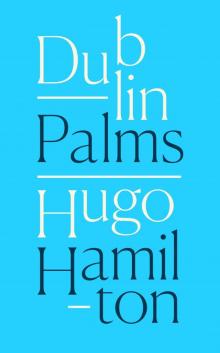 Dublin Palms
Dublin Palms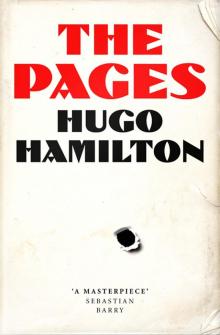 The Pages
The Pages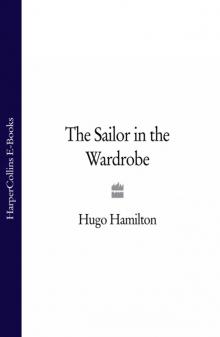 The Sailor in the Wardrobe
The Sailor in the Wardrobe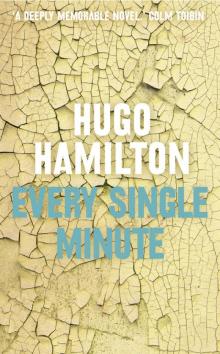 Every Single Minute
Every Single Minute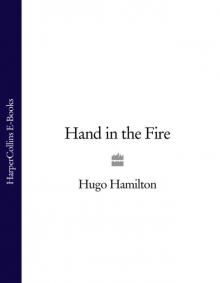 Hand in the Fire
Hand in the Fire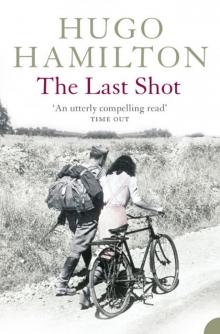 The Last Shot
The Last Shot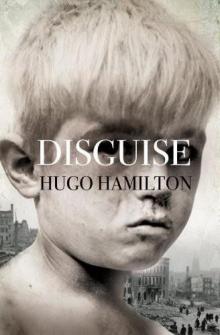 Disguise
Disguise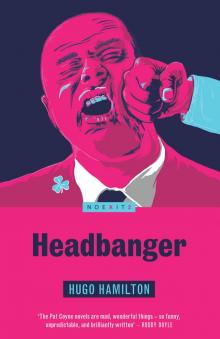 Headbanger
Headbanger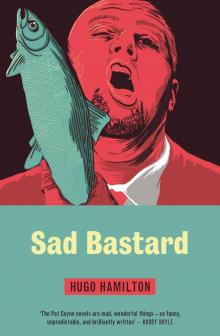 Sad Bastard
Sad Bastard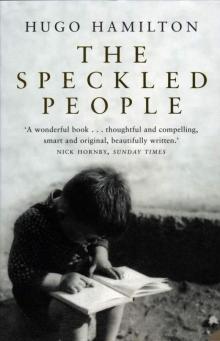 The Speckled People
The Speckled People